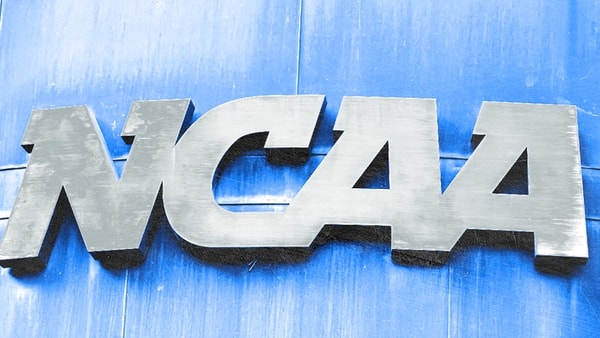What Greg Sankey told us to begin a critical stretch for college football's future

The party got started at SEC Spring Meetings on Memorial Day evening in Destin. We didn’t have to wait until the Fourth of July holiday for some fireworks. SEC commissioner Greg Sankey is fired up and fairly on edge.
The most powerful man in college athletics spoke with reporters at the lovely Hilton Sandestin Beach Resort in Miramar Beach for the first time this week. Sankey’s official state of the union will occur in seven weeks at SEC Media Days in Atlanta, but his yearly comments at spring meetings are growing in importance. It was clear that Sankey was a little ticked off and even engaged in some back-and-forth barbs with reporters.
KSR is covering everything going on down in the Florida panhandle for a very important week for Kentucky, the conference, and college athletics at large. As expected, talks centered around the College Football Playoff on night one with a new format scheduled to arrive in 2026. What will that format be? That is being determined right now.
Shots fired at the ACC and Big 12
Last year to get the 12-team College Football Playoff (CFP) up and running, the college football decision-makers conceded power to Big Ten commissioner Tony Petitti and SEC commissioner Greg Sankey. A memorandum of understanding was signed by the 11-member CFP governing board last spring that gives the SEC and Big Ten decision-making power.
But the ACC and Big 12 are making things difficult for Sankey after conceding power just a year go. Much of this stems from the financial disparity growing larger in the power conference ranks. The SEC’s leader let it be known on Monday that he hears the ACC and Big 12 making noise but he is not budging.
“You can issue your press statement but I’m actually looking for ideas to move us forward,” Sankey said in a direct shot to the other power conference leagues. We even had the Big 12 clap back shortly after that quote hit the internet.
Sankey would not go on the record of which format the SEC prefers but the Big Ten just did and we know that these two leagues are currently in lockstep with each other. A 16-team format with a 4-4-2-2-1 seeding model that would give auto bids to the SEC (four), Big Ten (four), ACC (two), Big 12 (two), Group of Five (one), and three total at-large invitations is reportedly the preferred route. However, the Big 12 and ACC have been pushing for three automatic bids.
That’s where the trouble lies. While many want Sankey — and the rest of the suits running college football — to do what’s best for the sport, we were quickly reminded that everyone serves a different constituency. Sankey is working for his members.
“Well, in our own room, I’ve had athletic directors tell me directly that we’ve given too much away to arrive at these political compromises,” Sankey said.
“I’m open to ideas. There’s just not a lot of incoming. My phone’s not ringing off the hook. So we’ll continue to be thoughtful. We’ll continue to try to provide perspective and information to our members and help them guide the decision.”
A war could be brewing as communication seems to be disjointed or just outright poor between power conference commissioners. Sankey’s words and tone seemed to indicate that the SEC is ready to draw a line in the sand. Could a pivot be to a 5-11 format where all conference have access to an automatic bid with the playoff committee giving out 11 at-large invitations? That’s what the ACC and Big 12 recently proposed. Maybe that’s the solution when you consider that the SEC would eat up those auto bids in most years, but Sankey probably wants to see major selection process changes before that is even considered.
There is also the inclusion of play-in games — on conference championship weekend — that need to be considered. So this all gets very complicated quickly but guaranteed multi-team access for the SEC seems very important to Sankey. An important meeting on June 18 between all parties awaits where a new format will need to get established.
Stumping for Alabama
The Alabama Crimson Tide have been in the middle of the storm in each of the last two seasons when it comes to controversy in the playoff selection process. Many were highly upset that the one-loss Tide got into the final four-team College Football Playoff over Florida State in 2023. That was flipped around in 2024 when many became outspoke online when Indiana and SMU were blown out in the opening round of the first 12-team expanded playoff while Alabama, Ole Miss, and South Carolina were each left out with 9-3 records.
Greg Sankey again made it clear that he wasn’t happy with the selection process. This is likely driving the hunger for multiple automatic bids. Sankey wants strength of schedule metrics to matter more than it’s mattering now.
Top 10
- 1New
Greg Sankey reacts
House vs. NCAA Settlement
- 2Hot
Landmark Approval
House vs. NCAA Settlement
- 3
EA Sports CFB 26
Schools paid based on usage
- 4
Manning Passing Academy
College QB attendees announced
- 5Trending
Keelon Russell
Mother releases statement
Get the On3 Top 10 to your inbox every morning
By clicking "Subscribe to Newsletter", I agree to On3's Privacy Notice, Terms, and use of my personal information described therein.
“You have a team (SMU) that played four games against teams with 6-6 records that got in,” Sankey explained. “Another team (Indiana) that didn’t really play anybody at the top of its conference got in.”
“It’s clear that not losing becomes more important than beating the University of Georgia, which two of our teams (Alabama and Ole Miss) did that were left out did. Nobody had that kind of quality win. You can’t just run down a College Football Playoff selection idea without thinking, well, if we play eight or nine games, that’s the depth of analysis we’re looking at.”
Sankey made sure to point out that the SEC clearly plays a tougher schedule than anyone else and that has to be considered on Selection Sunday — especially if the league goes to nine conference games. That move still seems likely this week.
The SEC’s current stance appears to be for the next playoff format to give them multiple automatic bids or to completely alter the selection process when evaluating at-large teams. The recent move to straight seeding for the final 12-team playoff in 2025 backs that up.
Keep your power league non-conference games
Nebraska recently canceled a future non-conference series with Tennessee that was backed up with head coach Matt Rhule explained that the Huskers didn’t need to play the Vols to get into the playoff. Simply put — playing games like this out of conference can hurt you more than it helps you.
A big concern with the playoff moving forward is that teams will stop aggressively scheduling in the non-conference. That ultimately hurts the product. There is a belief that SEC teams will look to cancel non-con series once the conference goes to a nine-game model. The Governor’s Cup series between Kentucky-Louisville appears to be very much in danger as UK has been a proponent of staying at an eight-game league schedule.
The SEC Commissioner does not want his members to cancel these games.
“We’d like to preserve these games,” said Sankey. “That’s one of the problems we’re encountering right now. We’ve seen that. I’ve heard that. We’ve even had discussions with our ADs who are thinking maybe I shouldn’t play this game.”
“When people are canceling games because of the selection process, that directly impacts the regular season.”
That ultimately gets us back to the selection process. Could the SEC threaten to cancel important non-conference rivalry games if the league doesn’t get their wish on selection criteria alterations? That seems possible. There is also the possibility that the SEC creates a scheduling partnership with the Big Ten in a package sold to ESPN and/or Fox for more revenue. Those games need to be rewarded in the selection process for them to make sense for the participating teams.
A war has started. The Big Ten and SEC wield all of the power. How messy could this get? That may depend on how aggressive the ACC, Big 12, and Notre Dame decide to get. Sankey is showing no interest in playing peacekeeper.








Discuss This Article
Comments have moved.
Join the conversation and talk about this article and all things Kentucky Sports in the new KSR Message Board.
KSBoard